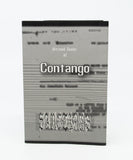How does an individual or group of individuals enforce their will upon another without the use of violence? In government these procedures are referred to as sanctions, often foregoing or preventing military intervention. These measures rarely result in the desired change, meaning their implementation is far less effective than their proposition.
When two parties negotiate power, a threat can play out in several ways. If a dominant force threatens the weak, it exercises its position as enforcer in an attempt to maintain the dynamics of the relationship. But if the weak calls the threat to action, it can potentially subvert those dynamics. In most cases, when two nations play this scenario out, less developed countries statistically benefit from imposed sanctions as their dependence on the outside world is reduced, thus creating a more stable economy and diminishing opportunities for outside economic coercion.
This second issue of Contango presents contributions from writers and artists whose work undermines dominant power structures through research, aestheticization, activism, and self reflection. It explores variations on the negotiation of power, the strategy behind legislation and the art of the bluff.
Dimensions: 6.75 x 4.5"
Materials: Full-color booklet
Contango Journal
(Humbolt Park)
Contango is a Chicago-based journal founded in 2016. We invite writers, artists, and activists to critically address current social issues. Rooted in economic discourse, Contango aims to rethink our relationship to systems of authority and explore potential futures in order to better understand the realities we inhabit today. In an economy where information is power, access and privilege must be questioned as a means for capital gain.




